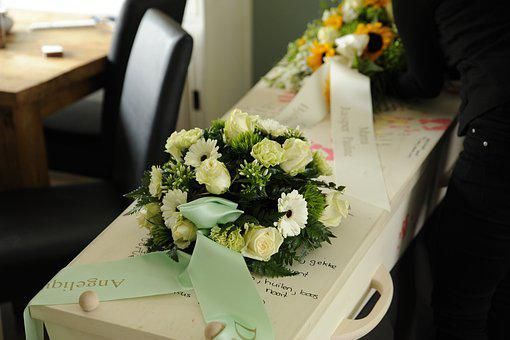How to Write a Eulogy
"The writing and reading of a eulogy is, above all, the simple and elegant search for small truths. This can be surprisingly hard, to take notice of the smallest, most unpolished details of a life and set them up for us to stare at in the wonder of recognition."
—Tom Chiarella, "How to Give a Eulogy"
How do you begin writing a eulogy? Editor Carol DeChant explains, "Obituaries are usually mini-biographies, focused on what a person did, but the eulogy is much deeper, more about who the person was...It's meant for the select group of people who knew and cared for that person, or who care for the survivors."
Eulogy Writing Guide
Having a eulogy writing outline or guide can be very helpful. The first and most important step in writing a eulogy is gathering information about the person and deciding what should and should not be included in the passage. The writer should share personal memories of the individual, but should also consider including the memories of their other loved ones. Having more peoples' perspectives will highlight the individuality of the deceased. Once memories have been decided on for sharing, the writer must craft the beginning, middle, and end of the eulogy.
Introduction
- Expression of sadness
- Life accomplishments, family background, and career information
- What the individual meant to those who knew them
Details
- Details about their life journey
- Include stories from loved ones
Conclusion
- Conclude with a quote about how the deceased affected those around them or make a connection to a story or memory that was told earlier on in the eulogy to close
Helpful Suggestions to Write a Eulogy
Christina Ianzito, in "How to Write a Eulogy," offers these suggestions; many of them come from Garry Schaeffer's book, A Labor of Love: How to Write a Eulogy :
- Outline the eulogy. In addition to helping you stay focused, an outline will keep your eulogy organized and effectively break down the task of writing into manageable pieces.
- Ask for the input of other family members and friends. They may be able to provide you with some great stories to share.
- Always try to share examples of the statements you make about your loved one. If you want to say, "she was generous with her time," tell a story that supports the statement.
- Do not focus too much on yourself. After all, this isn't a eulogy for you; keep your writing focused on your loved one. You may even want to ask others to read your first draft to make sure the focus is in the right place.
- Go for the humor. Shared laughter is a very healing experience so don't be afraid to make people laugh.
- Write the first draft. Don't fuss over every word; just get your ideas on paper.
- Put it aside for a while. This has, no doubt, been an emotional experience. Take some time away from the writing desk to get perspective and release stress or sorrow.
- Come back to edit and polish. This is the time to refine the eulogy into its final form.
Print a legible copy of the eulogy, in a large font, to assist in the delivery of your well-chosen words. There's nothing worse than not being able to read your handwriting when you're standing in front of a crowd of people.
Eulogy Outline
Use this eulogy outline to ensure you are including all of the most important information in your loved one's eulogy:
- Introduce yourself and describe your relationship with the deceased individual.
- Make note of the qualities that you and your loved ones found most prominent in the individual. This will set the tone for the remainder of the eulogy.
- Beginning from their birth, share details about their childhood and family life. Highlight their goals, admirations, and relationships with their loved ones.
- Tell stories of their life journey. Don’t forget to include their accomplishments (education, career, family, etc.).
- If one of your family members have a story about the individual that would tie back into the original qualities you mentioned at the start of the speech, repeat it to the congregation.
- Finally, finish the eulogy by quoting a beautiful literary passage. It could be a piece that the individual loved or one that reminds you of them.
Delivering a Eulogy
Unless you're a seasoned public speaker, delivering a eulogy can be a scary, emotionally-trying time. It is recommended that you:
- Take your time with the delivery.
- Breathe deeply.
- Stay relaxed.
- Take regular sips of water.
If you have any doubts about your ability to perform in front of an audience, consider appointing a back-up person to fill in for you. Or, you may ask someone else to take over the duty of reading the eulogy aloud on your behalf.
"Giving a eulogy is good for you," says author, Tom Chiarella. "It may hurt to write it. And reading it? For some, that's the worst part. The world might spin a little, and everything familiar to you might fade for a few minutes. But remember, remind yourself as you stand there, you are the lucky one. And that's not because you aren't dead. You were selected. You get to stand, face the group, the family, the world, and add it up. You're being asked to do something at the very moment when nothing can be done. You get the last word in the attempt to define the outlines of a life."
How Long Should a Eulogy Be?
A eulogy is one of the most important facets of a funeral or memorial service. It is important to keep this in mind when writing a eulogy. Although you may be worried about consuming too much time in the service, you should not cut out any of the important details. The eulogy paints a picture of the deceased individual through storytelling and memory sharing. Do not rush the process, as this eulogy will have an impact on those in attendance for a long time.










